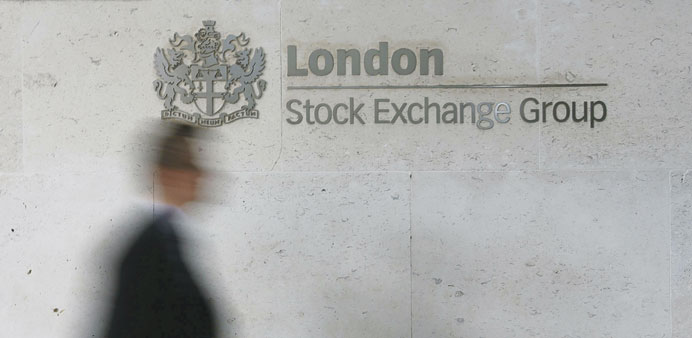A man walks past the London Stock Exchange in the City of London (file). The benchmark FTSE 100 index yesterday slid 0.09% to close at 6,940.64 points, having reached 6,974.26 points in morning trade, its highest intra-day level on record.
AFP/London
The British and German stock markets hit record peaks yesterday on hopes that eurozone quantitative easing stimulus, due to be outlined later this week, will bolster economic growth.
Investor sentiment was also given a shot in the arm after China cut interest rates over the weekend for the second time since November, but the rally quickly ran out of steam as oil prices dropped.
London’s benchmark FTSE 100 index slid 0.09% to close at 6,940.64 points, having reached 6,974.26 points in morning trade, its highest intra-day level on record.
Frankfurt’s DAX 30 index rose 0.08% to 11,410.36 points, having rallied during the session to an all-time peak at 11,455.08 points.
In Paris the CAC 40 fell 0.69% to 4,917.32 points. Madrid was flat and Milan shed 0.18%.
This Thursday, the European Central Bank (ECB) will unveil the details of the bond purchase programme it is kicking off this month.
Greece is also likely to be at the top of the agenda, following the recent eurozone deal to extend aid to the debt-wracked country.
Ahead of the meeting, official data showed Monday that the eurozone remained mired in deflation territory in February for the third month in a row, although the figure was an improvement.
Consumer prices in the 19-nation eurozone were down 0.3% in February, easing from a 0.6% drop in January.
Unemployment dipped to 11.2% to hit its lowest level since April 2012.
“Today’s economic data was good in many respects but many of those positives seemed to have a slightly negative undertone which prevented anyone getting too carried away,” said analyst Craig Erlam at online forex broker Oanda.
However Michael Hewson at CMC Markets said “it was a sharp decline in Brent oil prices that served to cap the upside in European equity markets, dragging most of Europe’s benchmark indices into negative territory, as the day progressed.”
European benchmark Brent North Sea crude for April delivery dropped $2.09 to $60.49 in late trading, as many traders took profits after bumper gains before the weekend and eyed plentiful world crude supplies.
Oil prices, which have fallen by around half since last June, have been a major driver behind slowing inflation and the threat of a deflationary spiral.
At its first meeting of the year in January, ECB chief Mario Draghi announced a programme to buy €60bn ($67bn) of private and public bonds each month starting in March 2015 until at least September 2016 in a bid to ward off deflation.
In a deflationary spiral, businesses and households delay purchases, throttling demand, triggering recession and causing companies to lay off workers.
The Frankfurt-based ECB’s decision-making governing council will hold its meeting on Thursday in Nicosia, Cyprus.
Meanwhile in foreign exchange activity on Monday, the euro dipped to $1.1190 from $1.1195 late in New York on Friday.

